Gordias and the Gordian Knot: Legend of Bold Resolution in Phrygia
Reading Time: 11 min
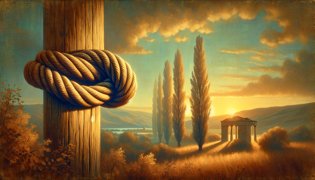
About Story: Gordias and the Gordian Knot: Legend of Bold Resolution in Phrygia is a Myth from turkey set in the Ancient. This Descriptive tale explores themes of Courage and is suitable for All Ages. It offers Inspirational insights. A myth of Gordias’s clever ascent to Phrygian throne and Alexander’s daring solution that changed Anatolian lore forever.
Introduction
In the shadowed vale of Phrygia, where the wind drifted through the poplar groves like a whispered secret, a young man named Gordias fashioned his place in the world. A humble wood-carver by trade, he harnessed two sleek oxen to a rough-hewn plough and worked the fertile plains with tireless resolve. He had come from nowhere, a stranger whose only inheritance was the heft of his arms and the steady rhythm of his heartbeat. Local folk would murmur, “Dereyi görmeden paçayı sıvama,” cautioning against hubris before proof, yet Gordias bore a quiet conviction.
One radiant morning, the scent of pine resin drifted from his workshop, mingling with the tang of fresh timber and the distant bleat of grazing goats. He resolved to honour the oxen that had drawn him out of obscurity. With rough linen gloves stiffened by resinous sap, he crafted a knot so cunningly woven that neither eye nor blade could discern its end. It sat upon an oaken pole at the city gate, a silent challenge to anyone who dreamed of rule.
Birdcalls echoed along the marble columns as he drove a simple cart through cobbled streets, the clatter of iron rims on stone marking his progress. Curiosity bloomed in the townsfolk’s eyes; mothers paused in doorways, merchants in stalls, all marvelled at the enigma. Rumours swirled like mist over the hills: some said the knot was unbreakable, others that it sheltered divine secrets.
Thus did a commoner’s quiet ambition plant a seed for legend, waiting patiently in the dappled shade of oak and laurel. Soon, the knot would meet a hand as daring as a storm and a mind as keen as Damascus steel, unfurling the course of fate for all Anatolia.
The Commoner’s Rise
In the small hamlet of Midas-era Phrygia, a modest forge glowed like flickering amber in the gloaming. Gordias arose at first light, his hands calloused as river stones from years of carving wood and shaping iron. His craft was known among merchants as sturdy as an oak trunk, and his reputation spread along mule tracks like wildfire through dry brambles.
He had no grand pedigree. No gilded tokens hung at his door. Instead, neighbours spoke of him with quiet respect, calling him “the son of earth and sweat.” One evening, as the glowing embers sighed in the hearth, the air carried the smoky tang of burning olive pits and the hoot of an owl beyond the window. The scent of roasted chestnuts clung to the beams.
Despite humble means, Gordias held an unwavering belief that destiny favours the bold. Twice his oxen had broken yokes; he mended them with simple iron bands and words of encouragement. “Allah bereket versin,” he murmured over each repair, trusting providence would bless his toil. Each phrase felt as sturdy as his ironwork, binding man to fate.
Night after night, by the flickering oil lamp that stung his nostrils with a sour note, he traced patterns in the ash at his feet and pondered the knot’s purpose. His mind raced with possibilities, each twist reminding him of choices left behind, like footprints in morning dew. The oil in the lamp flickered, casting long shadows that danced like restless spirits along the stone hearth.
He complained to no one. “Dereyi görmeden paçayı sıvama,” he’d heard as a lad, and he knew patience was work’s faithful companion. So he plied his trade in silence, letting the rhythm of hammer on pebble be his only song. Mornings smelled of pine resin and wet earth; afternoons rasped with the clatter of whetstones.
As years unfurled, his savings filled simple clay jars. He bought a single ox at market, then a second with the next harvest’s profits. Friends warned him against overreaching. "A man with two beasts is richer than many," they said. Yet Gordias only smiled, his mind humming like a spindle.
When the kingdom fell into turmoil and nobles vied for power, a marbled chariot thundered past his workshop one burnt-orange dusk. Gordias paused, the acrid stink of tallow candles thick in the air. He watched masked courtiers chase fortune, rattling sceptres like brittle bones.
Then the oracle’s proclamation echoed through the streets: let the one who unties the sacred knot sit upon Phrygia’s throne. Citizens gathered beneath white awnings; their chatter rose and fell like a restless sea. And Gordias, who had little but boundless resolve, stepped forward with neither banner nor claim, but a single cart and oxen to honour the gods.
With steady hands, he fastened his oxen to a plain wooden pole. Then he took the frayed ends of rope in hand. There was no pomp, no trumpet’s fanfare. Instead, donkey bells tinkled in a far lane, and a breeze brushed across newly ploughed furrows, carrying the scent of hopeful rain.
Villagers fell silent as he worked. His fingers, nimble as sparrow wings, twisted and wove, knot upon knot. When he was done, the final loop gleamed like a bronze serpent frozen in mid-strike. A hush settled like thick velvet. In that moment, Gordias had staked his future on an unbreakable twist of hemp and wood, and the commoner’s rise began with a single, resolute breath.
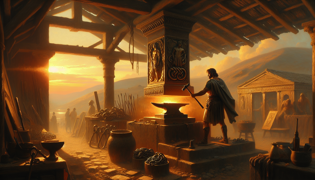
The Unyielding Knot
On the day Gordias displayed his knot at the city gate, the square hummed with anticipation. Market stalls stood like silent sentinels draped in scarlet and indigo cloth. The air pulsed with children’s laughter, the sharp crack of whips guiding laden donkeys, and the distant chant of temple priests intoning sacred hymns.
Gordias approached the pole, feeling the coarse hemp fibres bite at his calloused palms. The knot itself was as tangled as a forest briar, loops so cunning that a blind man’s fingertips might slip past the ends. Dust motes drifted in shafts of sunlight, shimmering like flecks of gold. He whispered a silent prayer and laid a weathered palm against the wooden post, its surface worn smooth by pilgrims’ hands.
An old shepherd stepped forward, his cloak smelling of brine and sheep’s wool. He tugged at the knot. His knuckles lost their white, and he stepped back, breathless and defeated. Then came the high-ranking merchant—her fine sandals scuffed the stones—who tugged and twisted until the rope glowed red in the sun, yet not one loop gave way.
From every corner of Phrygia, claimants arrived: minor nobles with varnished spears, wandering bards strumming lyres, even a burly blacksmith whose hammer lay idle at his feet. Each failed. The knot mocked them, solid as mountain roots and just as immovable.
A hush fell as the oracle’s torchbearers emerged, their flickering flames dancing on marble pillars. The chief priest declared the knot gifted by a capricious deity, a test beyond mortal skill. Yet Gordias watched in silence, his heartbeat like a drum echoing in a cathedral.
Hours passed. The sun arced west, turning the sky to molten bronze. Merchants doffed turbans, nobles loosened collars, and the square filled with the smell of roasted lamb cooking over open flames. A gentle breeze carried aroma of cumin and thyme.
Just as hope waned, Gordias stepped forward, rope ends in hand. He murmured, “Let this bind not my spirit but my reign.” With the certainty of one born to this moment, he drew a hidden blade from his belt and slashed through the centre of the knot. Frayed fibres snapped like spring’s first thunder.
Silence reigned, broken only by the distant bleat of a goat. Then the crowd erupted, some with tears, others with cheers. The pole stood as witness to a feat simple yet profound: when patience fails, sometimes courage cuts the way.
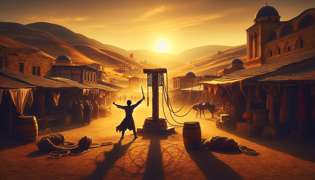
Prophecies and Premonitions
Word of Gordias’s bold deed spread like wildfire through Anatolia. Messengers galloped along dusty trails, their horses’ hooves drumming against sun-baked earth. At the oracle of Ammon, priests raised their arms in awe, studying entrails as though the slain ram contained the kingdom’s next breath.
In Macedon, the young prince Alexander heard whispers of this unorthodox triumph. He leaned over a bronze basin of water, the surface rippling with his fingers’ touch like disturbed glass. “A knot that binds soil and soul,” he murmured. His eyes glinted like polished jet under the torchlight.
Back in Phrygia, odd signs appeared. A white eagle soared overhead, its shadow dancing on ochre walls. At dawn, villagers found symbols scorched onto temple steps: loops and lines mimicking Gordias’s knot. No one could decipher their meaning, yet the priests spoke of destiny converging.
One night, as a pilgrimage of lamps flickered around the oracle, the high priest felt an otherworldly presence. The air grew heavy with incense. Flames crackled with a crimson haze. In a vision, he saw a man in armour brandishing a curved sword, his visage both stranger and king. A voice hissed through the chamber: “He who cleaves what men cannot find shall wear the crown of Phrygia’s fate.”
Dawn broke with a sky the hue of bruised grapes. Farmers raising their scythes paused to watch shafts of light twist through drifting smoke. A chill gust carried the musk of almond blossoms and the distant clang of temple bells. It was as if the land itself held its breath.
Alexander set out, crossing the Hellespont at sunrise. His fleets spread white sails like seagulls resting on water. Each wave slapping the hull sang a promise of conquest. He thought on Gordias’s knot—an emblem both trivial and profound. He pondered whether brute force or cunning unlocked life’s tangles.
As he neared Gordium, the air turned hot and dusty. Markets thronged with pilgrims. The ground trembled with the march of a thousand sandals. A lone shepherd boy, his face smudged with earthen dust, pointed at Alexander’s banners and cried, “Look! The man fated to sever destiny’s thread.”
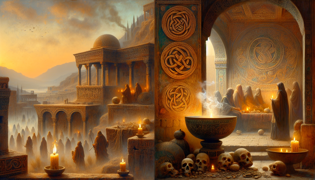
Alexander’s Daring Cut
When Alexander arrived at Gordium, the city gates stood thronged with onlookers. The dusty road crackled beneath warhorses’ hooves, each step a drumbeat heralding his approach. Soldiers in gleaming bronze armour flanked him, their shields emblazoned with the sun and eagle motifs. A distant lyre’s melody wove through the murmur of crowds, like silver threads binding the air.
The knot lay before him, more formidable than any foe. Its loops twisted like a serpent devouring its tail, each coil tight as a miser’s purse. Men had tried to unravel it, yet each attempt only deepened its enigma. Alexander dismounted, the leather of his saddle exhaling the scent of fresh sweat and oil.
Spectators leaned forward, the heat of anticipation making the air shimmer. A child clutched a clay cup, spilling dried apricot wine onto the stones. Nearby, an old woman fanned herself with faded parchment, the papyrus whispering against her fingers.
Alexander studied the knot with a practised eye. He circled it as a hawk surveys prey, noting where strands overlapped. Patience was his ally—until, in a flash, he gripped his glinting kopis. With one decisive swing, he cleaved the knot’s centre. Fibres tore apart like thunder ripping the sky. A weight lifted from the world.
The crowd gasped. Then erupted in a tumult of shouts. Trumpets blared, their notes soaring over flat-roofed houses. Women wept, men cheered, children danced in loops of jubilation that mimicked the knot’s broken curves. The air tasted of dust and triumph.
Alexander stepped back, beholding the scattered ends. “Fate yields to direct purpose,” he declared, his voice carrying across the plaza. He remounted, raising his kopis in salute. In that moment, the Gordian Knot ceased to bind, and a new era of bold resolution dawned upon Anatolia.
The lopped strands were gathered into the temple of Zeus, and Gordias, once a nameless craftsman, stood beside the conqueror. Their eyes met in mutual respect—two wills that had mastered the tangle of possibility.
Thus was born a legend, one that has echoed through ages like ripples on still water, reminding us that sometimes the clearest path is found by striking true and swift.
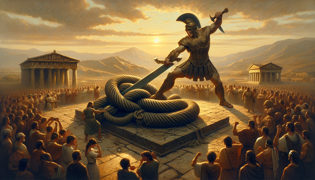
Conclusion
The story of Gordias and the Gordian Knot endures as a testament to courage over complexity. In Phrygia’s sun-drenched plains, a wood-carver’s modest act of honour set in motion a challenge that would outlast generations. His knot became more than woven hemp; it was a mirror held up to every soul wrestling with entangled choices. Alexander’s single, decisive stroke offered a lesson that reverberates still: boldness can unlock the most stubborn of problems.
Through the scent of resin, the murmur of crowds, and the silent awe beneath marble arches, this myth reminds us that fate is neither rigid nor merciless. It bends before intent sharpened by conviction. From dusty forges to opulent courts, from the oracle’s smoke-filled halls to the roar of soldiers’ cheers, the legend weaves itself across time like a golden thread.
May we, like Gordias and Alexander, find strength when paths seem knotted and uncertain. When hesitation ties us in loops, let us dare to cut through with purpose unflinching. For in that fearless moment, even the most entangled destinies can unravel into new beginnings under an Anatolian sun.

















